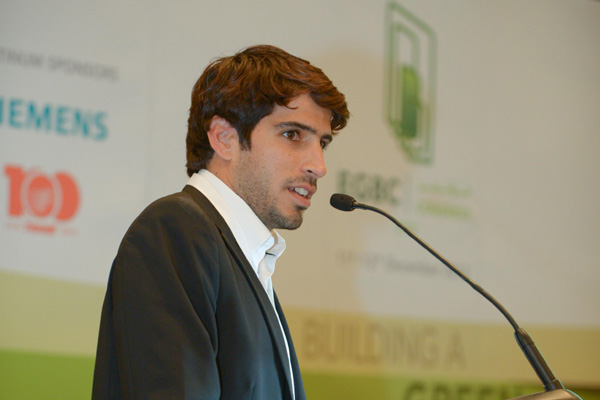
Al Abbar addresses the audience
UAE hotels have strong potential for energy ,water use savings - report
DUBAI, September 28, 2016
UAE hotels have unequal energy and water performance with high potential for significant savings using viable and affordable existing technologies, a new report has revealed.
The 'Energy and Water Benchmarking for UAE Hotels' report by Emirates Green Building Council (EmiratesGBC), an independent forum aimed at conserving the environment by strengthening and promoting green building practices, draws on information gathered from 46 voluntarily participating hotels across the country on their property’s general, physical and operational characteristics as well as annual energy and water consumption data.
The report studied energy and water consumption data over a three-year period (2013-2015) for the comprehensive study.
The key findings correlate with a recent report that Dubai’s five-star hotels consume up to 225 per cent more energy compared to their counterparts in Europe.
There is a strong need to replace old fixtures and ensure maintenance of water systems, with laundry services and landscaping contributing heavily to water use intensities. The study also finds that poor performing hotels consume three times the amount of energy and 7.4 times the water compared to the best performing hotels.
More recently built hotels were found to benefit from newer technologies and efficient design as well as stringent codes & regulations, underlining need for older properties to consider retrofit as a solution to reduce their carbon footprint.
Saeed Al Abbar, chairman of EmiratesGBC, unveiled the key findings of the report at an event attended by industry stakeholders. At the event, Faisal Ali Hassan Rashid, director – Demand Side Management of Dubai Supreme Council of Energy (DSCE), delivered a keynote on the importance of the benchmarking for the UAE hospitality sector to achieve the goals of the Council and to support the Dubai Clean Energy Strategy 2050.
Al Abbar said: “The benchmarking report is a first of its kind study in the UAE aimed at establishing quantitative data on the energy and water efficiency of buildings within a key sector of the economy. The study aligns with the UAE’s two-pronged goal of driving best practice and growth in the hospitality and tourism sector as well as being a global leader in sustainable development. The findings will serve as a strong indicator that will enable the hospitality sector to reduce its carbon footprint by improving water and energy performances. We are thankful to the participating hotels for their commitment and resolve to enhance their energy and water use efficiency standards.
“The comprehensive study will enable the hospitality sector to observe best practices in energy and water efficiency, which also make business sense in the long-term with an increasing number of travelers being highly discerning about the sustainability standards of the hotels. Driving energy and water use efficiency standards in hotels will help differentiate them in the marketplace and also make them active partners in achieving the sustainability vision of the government,” he added.
An ongoing initiative
The initiative is part of EmiratesGBC’s ongoing efforts to reduce the carbon footprint of the UAE’s hospitality sector, and is based on feedback received from hoteliers on the high cost of retrofitting existing properties, lack of benchmarking tools and lack of relevant indicators to compare properties against each other. EmiratesGBC also reached out to tourism bodies in the UAE and hosted workshops on green hospitality.
An expert team at EmiratesGBC analysed the energy use intensity (EUI) and water use intensity (WUI) of the participating properties to understand their performance. They also compiled correlation factors to identify the key indicators that may influence the consumption patterns of the hotels vis-à-vis their individual characteristics. These will serve as the benchmark for the specialised hospitality training modules to be launched by EmiratesGBC later this year.
All participating hotels have been provided with individually tailored benchmarking scorecards that will help them to make enhancements to their energy and water use protocols, and will help support them in their strategic initiatives – both technical (involving retrofits or audits) and behavioural (education and training).
The report and the training programme to be unveiled build on EmiratesGBC’s credentials as the official operator of the Green Key eco-label programme in the UAE. Recognised by the World Tourism Organisation and United Nations Environment Program (UNEP), Green Key is a non-profit and independent programme, and is the largest global eco-label relating to accommodation.
Globally, tourism contributes to 5 per cent of the total world carbon dioxide emissions. The United Nations has now declared 2017 as the ‘International Year of Sustainable Tourism for Development.’ The benchmarking exercise and follow-up action by EmiratesGBC is just in time to support the global focus on promoting best green practices in the tourism and hospitality sector. EmiratesGBC will update, fine-tune and repeat the benchmarking study on an annual basis.
The EmiratesGBC working team included Majd Fayyad, technical officer; Marie-Helene Westholm-Knebel, senior technical officer; Lora Shrake, operations director; and Sheena Khan, Education and Awareness officer, with the support of all participating hotels, Taka Solutions, M.A.H.Y Khoory & Co., Ajman Tourism Development Department and Sharjah Commerce & Tourism Authority. - TradeArabia News Service







